
(NCS writer BadWolf is killin’ it this week. Yesterday he turned in a Wolves in the Throne Room concert review with some amazing photos, and today we’ve got another one of his typically entertaining and insightful interviews. This time the subject is Moloch of Sumerian black-metal band Melechesh, who we find out is pursuing a PhD in philosophy, and this interview veers away from music and into some very different territory by the end. )
Melechesh want you to kill your TV.
This enlightening interview was held on St. Patrick’s day at Blondie’s in Detroit, while Melechesh was on tour with Hate, Rotting Christ and Abigail Williams. My subject was Moloch, rhythm guitarist and original member. Our conversation began with music, and the band’s excellent 2010 record The Epigenesis.
By the end our minds were on… other things.
Oh, and they were by far the best band on the bill.
BadWolf- This is your first national tour of the United States, how does it feel?
Moloch- It’s an interesting experience to say the least. We’re here to test the grounds, see how things are going. So far it’s been a mix of amazing, special and crappy. We’ve already covered a wide spectrum in the first week. From now on things are going to get really good. (more after the jump . . .)
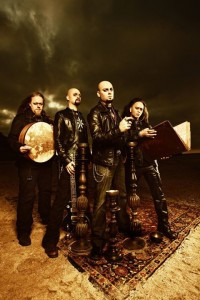 BW – You think so?
BW – You think so?
M – We’ve had some interesting days already. Playing in Trenton was like playing in a living room, which is great. It was like 200 people—lots of fun. We’re getting things we didn’t on our previous European tour with Nile which was just big clubs, with guarantees lots of people. We miss the showers, but hey it’s rock and roll.
BW – What do you think makes a good show vs. a bad show in America?—from your outsider perspective.
M – It’s what makes a good show everywhere. DECENT SOUND! We played a couple shows with no monitors—it’s kind of hard to play without hearing your own music. Good crowds. You need the feedback. It could be twenty people, it could be 700. If you have that feedback it makes for great chemistry.
BW – Which would you prefer? Blondie’s [Detroit] is a very intimate venue.
M – I love intimate venues. I just want the crowd. I want people to be reacting. Once that link is established, you know you’re in for a great gig. Sometimes people just want to see the local band, not the tour, and those weird environments make for a crappy show.
BW – So you’re promoting The Epigenesis, can you tell me about the creation of the record?
M – So it’s our fifth album. With time you feel more comfortable with what you do; you dare to do more things; you have confidence in the things you do. In that sense I feel The Epigenesis is a very mature album.
We didn’t set out to do anything, we just let things come. We gave it time to filter and select—we aren’t the kind of band that rushes into recording. We gave it four or five years of work. Then the recording process added an interesting aspect itself. We recorded it in Istanbul which is very inspiring.
BW – In a new studio!
M – In a brand new studio. The equipment is first class. It’s a really great place with great people. We had a Grammy-award winning crew who never really worked with metal, but have PhD’s in sound so they know what they’re doing. We wanted a very organic record—we even have leads where we used natural reverb from a staircase. We used every resource, we used local musicians with traditional instruments. We picked a few people off the street—we just saw them walking and… ‘We like your instrument, do you want to play on an album?’ ‘Sure.’ That gave it the extra push at the end that made it delightful.
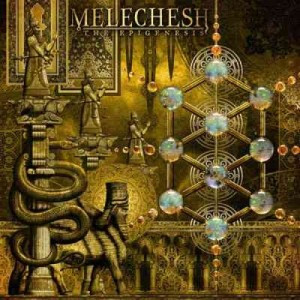 BW – I think The Epigenesis is a bit of a departure in your catalog—it has less raw black metal and more of that folk music flavor.
BW – I think The Epigenesis is a bit of a departure in your catalog—it has less raw black metal and more of that folk music flavor.
M – It’s funny, I hear all sorts of comments. I heard someone say the exact opposite. Some people said there weren’t enough… let’s call them ethnic Middle Eastern elements. Too much thrash, not enough thrash. Too much black metal, not enough black metal. It’s a good thing to have this variety of responses; it means the album is rich enough to evoke these different reactions in different people. That was the goal, a very multi-faceted album. The song “Defeating the Giants” has a Bathory-style riff we wrote back in 1995. That’s an aspect of Melechesh we always want to preserve. We wanted different atmospheres on different tracks—different feels.
BW – When you have this huge sonic palate to play with, how does that factor into song selection in the live set?
M – We do a lot of thinking into what goes on live. What goes into rehearsal, what goes into a recording studio and also live are three different things. In rehearsal we have twenty-minute jam sessions with drone riffs and improvisations, but that’s something that goes on between us you know? On this album we wanted more of these progressive elements. The last song, “The Epigenesis”, is like fourteen minutes long with improvisation segments. You can’t always do that live unless you have a headlining show. We did a short headlining tour in Europe where we played “The Epigenesis” itself. I opened it with traditional instruments; we did the improvisations, the jams.
When you have 45 minutes you want everything to be direct, clear, to the point. So, you’ll notice we do a lot of edits—we lose the beginning, or the end changes a bit. We think about all these things and then make certain choices.
BW – Is there any one track from The Epigenesis that is your favorite to play?
M – I’ve been playing The Epigenesis songs since November, so I’m starting to get a feel for them. I think the ending of “Grand Gathas of Baal Sin” really gets to me. Usually I really go berserk then. “Sacred Geometry” has been treating us well. That’s the groove there. And “Ghouls of Nineveh.” We wrote those songs with this idea of ‘just imagine the crowd headbanging.’ So when you record it you can’t wait to play it live, and when you see people headbanging you just go ‘fuck yes!’
I enjoyed playing “The Epigenesis” on our short tour, but we aren’t playing it live tonight.
BW – When you write songs, is the process more jam oriented, or do you or Ashmedi come into the room with a complete song?
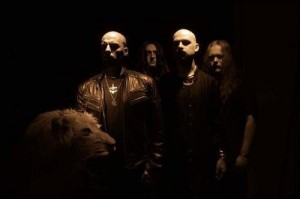 M – Ashmedi is the main composer of Melechesh. He does about 80% and I’m the other 20. But, like I said, we like multifaceted songs, so we write in multifaceted ways. Some of these tracks are the result of Ashmedi jamming with Xul in the recording room. Sometimes they would play around for 30 minutes and something would come up. “Negative Theology” was like that, one jam session that turned into a song. Then sometimes you have a track like “The Epigenisis” which happened when I visited Ashmedi—I go there to Holland a lot. It was just two soul brothers jamming at four in the morning in Holland.
M – Ashmedi is the main composer of Melechesh. He does about 80% and I’m the other 20. But, like I said, we like multifaceted songs, so we write in multifaceted ways. Some of these tracks are the result of Ashmedi jamming with Xul in the recording room. Sometimes they would play around for 30 minutes and something would come up. “Negative Theology” was like that, one jam session that turned into a song. Then sometimes you have a track like “The Epigenisis” which happened when I visited Ashmedi—I go there to Holland a lot. It was just two soul brothers jamming at four in the morning in Holland.
BW – So you don’t live in Holland, where do you live?
M – I live in Virginia.
BW – What? [laughs] That’s great.
M – I know. Its funny isn’t it? So the band started in Jerusalem but I lived in Bethlehem, where Jesus was born.
BW – That’s… kinda cool.
M – Yeah, he was born 20 minutes from my house, which is kind of strange.
BW – Do you feel special about Bethlehem, then? In either a good or a bad way—you know.
M – If you go, you’ll see that Bethlehem is not that special. But once you go around the world and say ‘I’m from Bethlehem,’ people say, ‘What the fuck? Really? Bethehem, Pennsylvania, or the real Bethlehem?’ So, I moved to France, which is just a 3-hour drive from Holland. So Djinn, Sphynx and Emissaries were all written between France and Holland. I moved to the United States after Emissaries, to pursue my PhD in Philosophy.
BW – Congratulations.
M – Please, not yet. It’s not done.
BW – But that’s admirable to make that effort.
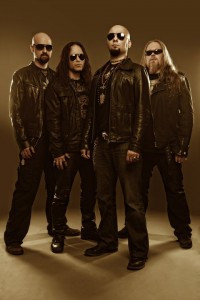 M – Yes, and for me it kind of feeds the soul the way music does. Now I live in Virginia and there’s a lot of back and forth. When we were just writing the album I would go over for a month, then come back. After those, there was one month of intense rehearsals and one month in the studio. I’ve made some sacrifices which… annoy my mother and my PhD Advisor. [laughs] I am the kind of guy who gets things done, though. So I will finish.
M – Yes, and for me it kind of feeds the soul the way music does. Now I live in Virginia and there’s a lot of back and forth. When we were just writing the album I would go over for a month, then come back. After those, there was one month of intense rehearsals and one month in the studio. I’ve made some sacrifices which… annoy my mother and my PhD Advisor. [laughs] I am the kind of guy who gets things done, though. So I will finish.
BW – I have to ask a personal question, as someone who has been both an academic and involved in the metal underground. Do they cross-pollinate for you? Do those worlds intersect in your life?
M – They do, but Philosophy is something that I relate to outside of academia as well. I do what they call political theory—I specialize in political philosophy. I’ve been trained in philosophy for seven, eight years. So, I’ve done everything; these cold hearted prototype things kill it for me sometimes, but it’s the only environment where I can actively pursue this passion. I have fellow people who do these things with me and they aren’t the kind of people you meet on the street. You can’t walk up to someone and say ‘hey, do you want to discuss Aristotle?’ You need an academic environment to do that.
For me there’s a lot of crossover, but I can’t really cultivate that crossover in academia. Of course there’s people writing papers about metal but.. ‘In this paper I will examine the sociological effect of postmodernity on black metal!’ Just. Shut. Up. I’m listening to Anthrax here! [laughs]I don’t need your shitty opinion, or your shitty excuse to write a paper.
So it’s a personal crossover. There are things to philosophy that matter outside of academia. There are also things to music that matter outside of music. I hate people who only talk about music in musical terms. At the end of the day you’re a human being, like me, and you relate to it as a human being. So let’s talk about this, not those three notes you added to your scale—which is interesting! But think outside of the box. See beyond. I think in music and philosophy that’s where you get to things.
[d00shc00gr and BadWolf take some time to absorb this answer, but find it very amusing.]
M – I have to teach an undergrad philosophy course. For a lot of these kids it’s their only philosophy course and I tell them: this may be your only chance to read these things. It might sound awkward and not make sense as you read it, but this is your only chance and it is not offered to everybody! But now I’m getting outside of Melechesh.
BW – You’re not, though.
M – I guess you’re right. I fully embrace my musical and academic schizophrenia.
BW – Do your students ever listen to your music?
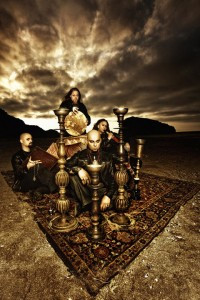 M –No, no. Well, some end up knowing. I don’t actively promote it the first day. Then sometimes I come to class and forget I am wearing my gruesome death metal tee shirt. Here you are giving a lecture on Plato or Rousseau and there’s fucking gore all over your shirt.
M –No, no. Well, some end up knowing. I don’t actively promote it the first day. Then sometimes I come to class and forget I am wearing my gruesome death metal tee shirt. Here you are giving a lecture on Plato or Rousseau and there’s fucking gore all over your shirt.
[laughs]
BW – So nobody from the band still lives in Israel.
M –No, and also we are not Israeli—that’s something we like to clarify in interviews. I’m Palestinian and Ashmedi is Armenian-Syrian. Xul and Ram are Dutch. Our families are still there, so we go back often. I go back once a year, and I love it there but I don’t know anymore. I don’t know if I will live there. I’m not sure Melechesh can migrate back to Jerusalem after all this exodus.
BW – Is it happier outside the walls?
M – We are not happy but… If you come from a certain background in a certain country you’re stuck. So you’re stuck at this level, and you’re also stuck musically because whatever scene exists is very self-contained. Very few bands ever make it out. If you look at the Middle East, those bands are completely isolated. So, does that work for a band like Melechesh where we did everything to promote ourselves and reach this level? I don’t know. But we go back a lot of the time. Istanbul is a nice replacement for Jerusalem. It’s in the same area, but it’s nicer. There’s more culture for me. Great food, great local music.
BW – So you know how metalheads play this silly little game where we name some obscure band we love, but nobody else likes? And you trade off. For years you were my trump card in that game. Now, in the past two years it’s only worked once. People know who I’m talking about, now.
M – That’s great. It gets frustrating to keep hearing ‘we don’t know who you are, but we love your music. You’re so underrated.’ When you hear it for years and years you’re just like… Just shut up!
BW – Well it is black metal.
M – But even in black metal it’s like Melechesh was always the underrated band nobody knows until they hear us and then they think it’s amazing. That’s why we tour, you know, but we feel stuck in that. We want things to grow. The US is different, that card works here sometimes but in Europe, not as much. We’re here so people can stop playing that game.
[laughs]
Which is funny because our first album was released in the US. We weren’t aware that we’d acquired some sort of kvlt black metal status in the US and South America that we never had in Europe. That only happened because we released that album here in ’96, and here we are in 2011.
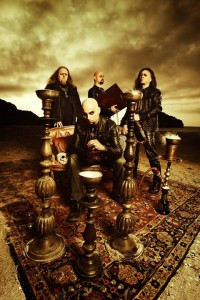 BW – You know you’re some people’s only view into another culture. All some people have is the music they listen to, the films they watch, and the news on TV, and I’m not sure you’ve noticed but you can’t really trust the news here. Fair and Balanced!
BW – You know you’re some people’s only view into another culture. All some people have is the music they listen to, the films they watch, and the news on TV, and I’m not sure you’ve noticed but you can’t really trust the news here. Fair and Balanced!
[laughs]
M – I come from Israel where all the news is biased because that’s the only way to do it, but I find it to be even more biased here! [laughs]
BW – What can you relate to me about that experience, as someone actually from the Middle East?
M – Let’s start with the don’ts—don’t bother listening to what they say on TV. Don’t listen to just one side, listen to all the sides, and I say that as a Palestinian.
Try to think less of other people as ‘them.’ Instead, think of what’s keeping you from seeing certain aspects of ‘them.’ That’s the more philosophical question. Looking into others teaches you more about yourself than it does about others. It teaches you about the frames you have that don’t allow you to see certain things. When I travel, I think of this first of all. Our world is becoming more and more homogenous—you can find Starbucks everywhere, but when I see a difference the first thing I ask is: what’s making this difficult for me. What does this say about X, Y and Z that I believe in? That’s the ethical exercise I would call on you and others to do when you see the Middle East. Once you get rid of your TV.

Fantastic fucking interview. Thanks!
I find this band inspiring on so many levels, not the least of which being that they actually understand the concept of artistic integrity and that there’s a difference between “connecting with your fan base” and “selling out”.
Also, when I start teaching undergrad classes I’m totally wearing gore metal t-shirts to class every day.
I think this interview just convinced me that I do, in fact, want and need to get my PhD after all….
Otherwise, awesome, awesome interview.
Ummm…maybe I should listen to their music, eh?